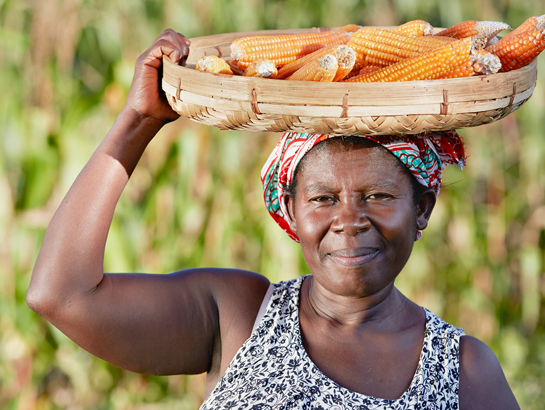In Kafue district, Zambia, a group of women has been working tirelessly to combat the prevalent malnutrition affecting their community. Children in the area suffered from malnutrition, specifically vitamin A deficiency, leading to weakened immune systems and impaired vision. Determined to make a change, the Chikoka Women’s Group planted orange maize for the first time in 2010 when HarvestPlus introduced the vitamin A-rich variety to the region.
Aida Kapipi, the chairperson of the Chikoka Women’s Group, is full of praise for HarvestPlus, whose intervention has significantly improved the lives of group members and their families. Not only did HarvestPlus provide biofortified seeds, but they also offered training on recommended agronomic practices and raised farmers’ awareness of the crops within the community. She, like other group members, agrees that they continue to grow vitamin A maize 14 years later due to its immense benefits. As a result, their families are healthier, and their livelihoods and food security have greatly improved.
Kafue district, located in Lusaka Province, was the first to adopt nutrient-enriched biofortified crops such as vitamin A maize, vitamin A sweet potato, and iron-rich beans (Mbereshi). “Vitamin A maize is very nutritious. It has helped to improve the health status of our family,” says Astrida Muti, a farmer in Kafue district. The farmers have created innovative recipes using the orange maize, such as “samp,” a maize rice made from vitamin A orange maize mixed with sour milk to create a nutritious meal.
Beatress Phiri, the group’s treasurer, has been growing orange maize since 2010. While she cultivates both white and orange maize, her preference is for the orange variety, which she finds tastier. Unlike ordinary white maize, orange maize is rich in vitamin A, which helps prevent its deficiency in the body. After the first season, the group members immediately saw the potential of the crop and rallied fellow women to embrace the new variety.
The journey was not without challenges. Many in the community were skeptical of the orange maize, suspicious of its unusual color and wary of change. However, the members of the Chikoka Women’s Group decided to lead by example, with a mission to promote the cultivation and consumption of vitamin A orange maize to improve the community’s health. To address the community’s skepticism, the women hosted cooking demonstrations. They invited local farmers to taste the orange maize, preparing traditional dishes that were both delicious and nutritious. Group members shared stories of how the maize had improved their children’s health, making them more resistant to diseases.
Inspired by the success of the Chikoka Women’s Group, more women’s groups, such as Kwashamukwenu Women and Mooto Women, began to adopt the orange maize. Chikoka Women’s Group members continue to support their community, offering seeds, advice, and encouragement to new growers. The impact has been profound. The adoption of vitamin A orange maize has given hope to countless families, ensuring food and nutrition security for the community.
